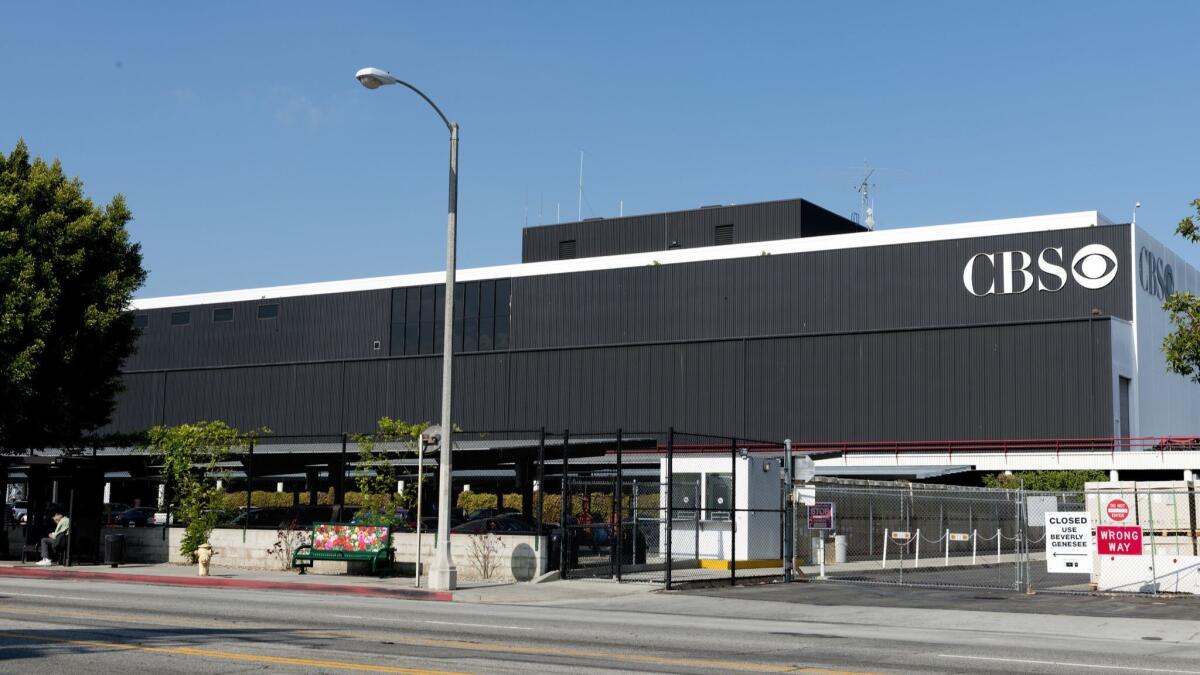CBS Television City moves closer to receiving historical landmark designation

Los Angelesâ Cultural Heritage Commission has approved a plan to declare CBSâ Television City studio complex on Beverly Boulevard a historic and cultural monument.
Over the years, such shows as âAll in the Family,â âThe Smothers Brothers Comedy Hour,â âThe Carol Burnett Showâ and âDancing With the Starsâ were produced at Television City, which opened in 1952 as a model of state-of-the-art technology. The complex helped accelerate the migration of television production to Los Angeles from New York and build one of the regionâs signature economies.
âItâs an important touchstone.⌠Itâs part of the identity of Los Angeles,â Adrian Scott Fine, director of advocacy for the Los Angeles Conservancy, said Thursday in an interview after the commissionâs vote, which was unanimous.
The plan still needs approval from the Los Angeles City Council, and the council could take it up as early as next month.
Last fall, the conservancy mobilized to win the landmark designation for the complex after news surfaced that CBS was considering selling the property, which is in the heart of the increasingly desirable Fairfax district. Television City has eight soundstages, the majority of which CBS leases to other companies. CBS is planning to retain the 25-acre site, at least for now, and could eventually develop the space itself.
âCBS wanted to retain its option to develop on the site while also saving what is historical about it,â said architect and historian Alan Hess, who prepared the nomination for the conservancy and participated in the process.
CBS wanted to ensure that the landmark status did not interfere with daily production activities at the busy complex. The company worked closely with the preservation group and agreed to keep intact the midcentury architectural elements. CBS also made a commitment that views of the building from Beverly Boulevard would not be obscured by further development, which had been a priority of the conservancy, Fine said.
A signature element â a walkway over a bridge covered by a Googie-style canopy made of corrugated steel and painted red with lettering that reads âTelevision Cityâ â also will be preserved.
âThe unified nomination with the conservancy recognizes the cultural and historical significance of the building, while preserving our ability to operate CBS Television City as a modern television production facility,â CBS said in a statement. âThis is a very good outcome.â
CBS long has been proud of its role as a pioneer of television. And it recognized the cultural significance of the complex to Los Angeles, so it worked collaboratively with the group, said Fine and Hess.
âThis was a great example of a good corporate citizen doing the right thing for the city â and that doesnât always happen,â Hess said.
Television City sprung to life two years after CBSâ founder, William S. Paley, decided in 1950 to relocate much of his companyâs entertainment operations to Los Angeles from New York. It was clear that television would eclipse radio, so that year CBS purchased the property at Fairfax Avenue and Beverly Boulevard to construct cavernous studios that could be equipped with cameras, lighting and studio audiences. The company did not have enough space at its Columbia Square property on Sunset Boulevard, so it spent a reported $7 million to build the futuristic complex with its midcentury design by noted architect William Pereira.
Viewers at home also recognized the facility. For decades, at the beginning of a program, an announcer would intone: âFrom Television City in Hollywood:â
âThe Price Is Rightâ has been shot in the same Television City soundstage since 1972. In addition, ABCâs âDancing With the Starsâ and âAmerican Idolâ shoot there, along with HBOâs âReal Time With Bill Maherâ and soap operas such as âThe Young and the Restless.â
The conservancy also wanted to preserve the building because it represented the work of Pereira. (He along with another architect designed the Theme Building at Los Angeles International Airport.)
âThis is one of his first buildings to receive a landmark status,â Hess said.. âPereira has not been well appreciated, but he really was one of the main architects to shape Los Angeles in the midcentury boom years.â
Staff writer Roger Vincent contributed to this report.
More to Read
Inside the business of entertainment
The Wide Shot brings you news, analysis and insights on everything from streaming wars to production â and what it all means for the future.
You may occasionally receive promotional content from the Los Angeles Times.











